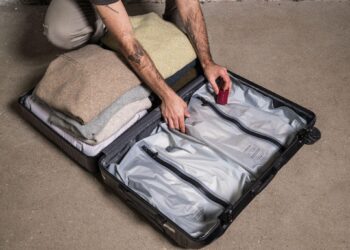The business travel industry took a hit in 2021, used 2022 to regain its footing, and is back stronger than ever in 2023.
Today’s travel managers will find that the changes post-COVID help streamline their roles. Policies are now geared toward simplifying the travel process from start to finish through delegation (with transparency, of course).
It might sound counter-efficient to let go of control of much of the travel booking process. But with so many travel management platforms and software available, it can increase your ROI and decrease internal time and expense.
So how can you manage your company’s corporate travel effectively and boost your profit margin in 2023? Check out these tips to streamline your business trips this year and in the future.
1. Adjust Your Processes for Modern Travel
When was the last time you adjusted your corporate travel policy? If it’s been a hot minute, your processes are likely out of date.
Modern travel policies include three main factors: efficiency, trust, and transparency. You must create processes that are simplified and well laid out so that they’re time- and cost-efficient. Your next step is to train your staff to use these processes so you can trust them to implement them without your input and micromanagement.
Be transparent about meals and incidental expenses, preferred vendors, and choices. This makes it easier for your travelers to understand what’s reimbursable, how much they can spend, and where they can dine, lodge, and book transportation.
Transparency works both ways, too. After each trip, find out what worked and what didn’t with your travelers. How can you maximize efficiency? Have things changed with a vendor since you last worked with them that might make them less preferred?
When you’re willing to listen to those who are out on the road putting your policies into action, they can become more effective.
2. Use the Right Tools for the Job
Just as you wouldn’t use a hammer to put a screw into a board, you shouldn’t use an all-in-one booking tool to try to maximize your travel tasks. Sure, it could do the job, but it wouldn’t be efficient.
The right booking tool is designed for the job you’re trying to complete. Gone are the days of one-size-fits-all travel management platforms. Instead, look for experts who know how to get you top quality for the best prices when you book lodging, rental cars, airfare, and other travel essentials.
These expert platforms should come with 24/7 customer support with immediate online access to FAQs. Urgent concerns need fast responses, so the turnaround time for chat and phone responses shouldn’t be more than 30 minutes.
Include these platforms in your work processes, and use their reports to help you organize each trip and view your travel spending data. You’ll know you’re using the right tool for the job when your administrative and finance teams can collaborate without a hassle and your travelers can do much of the booking and Q&A themselves.
Be sure that the self-booking policies include parameters that you set. Travelers can book using a company credit card with a specified spend limit and use on-file cards for deposits on hotels and car rentals.
3. Automate Where Possible
Whether you love technology or hate it, the reality is that automation makes your job easier. When you create approval workflows that let your travelers do their job without asking for your permission, everything goes faster, and you have time to do more complex tasks.
As you design new workflows, keep your travel policy compliance measures in mind. Try to build a workflow that checks off these requirements naturally to avoid extra work at the end of the trip.
Let your travelers choose and book their airfare, rentals, and lodging with the filters you preset in each platform. You can review these bookings on your terms without delaying the travel plans.
The automated policies can be as rigid or flexible as you choose. For example, you may decide to set one maximum rate for lodging or change it based on destinations. The number of days travelers can book transportation and hotels in advance can be strict or may be based on how long the trip is scheduled to last.
As the travel manager, you set the parameters. Your travelers can do the work as long as their bookings fall within those specific requirements. Since you’re in control of the platforms and payment tools used, you have full transparency on demand.
Conclusion
The changes in technology have never been coming faster than they are in the 21st century, and they’re impacting the hospitality industry in waves. Your business travel policies must be able to use the innovations available to you in order for you to maximize your time and your company’s ROI.
These three simple tips allow you to streamline your business travel procedures and make your job a little less complicated.







